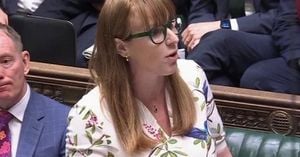Iraq is facing severe challenges to its wheat harvest, significantly affecting the country’s agricultural output and food security. Farmers are grappling with increasingly difficult conditions, exacerbated by climate change and inadequate infrastructure.
The significance of wheat for Iraq's economy cannot be overstated. It is one of the primary staples for the population, with many families depending on it for their daily meals. Jasim Ali, a farmer from the central region, stated, "We're struggling to keep our fields alive; the weather just keeps getting worse". His words encapsulate the growing frustration among farmers and highlight the dire predicament faced by many across the nation.
The situation has been deteriorated by the impacts of climate change, with increasing droughts and high temperatures wreaking havoc on the agriculture sector. The Iraqi government has acknowledged these climatic changes, yet the response to aid the beleaguered farming community has been insufficient. Farmers report difficulties with their irrigation systems, contradicting the importance of effective water management for crop production.
Farah Jabir, an agricultural expert, emphasized the pressing need for enhanced irrigation solutions, stating, "We need more effective irrigation solutions to tackle this crisis." These challenges are compounded by systemic corruption and inefficiency within governmental institutions, which hampers timely and effective action. The agrarian policies seem overwhelmed by the realities on the ground, leaving many farmers to fend for themselves amid crumbling agricultural systems.
The economic ramifications of the declining wheat harvest are severe. Iraq already relies heavily on imports to meet its wheat demands due to insufficient domestic production. This dependency makes the country vulnerable to global market fluctuations and trade policies, leaving citizens susceptible to rising bread prices and food insecurity. The government’s failure to adequately address these challenges not only threatens agricultural stability but also the livelihood of countless families.
Local reports suggest dissatisfaction among the agricultural community, highlighting calls for more substantial government intervention to revitalize the farming sector. Efforts to introduce more sustainable practices have been slow, and there is widespread discontent over the ineffectiveness of existing government initiatives. Farmers voice their frustration about the lack of resources and support, making it clear this is not just an individual struggle, but one confronted by many of their peers across Iraq.
Increasing awareness on the challenges facing the agricultural sector has prompted some organizations and NGOs to rally for reform, drawing attention to the necessity for innovative agricultural practices. Adoption of more resilient farming techniques and improved irrigation systems will be pivotal for the future of wheat farming in Iraq.
Despite these obstacles, some local farmer cooperatives are mobilizing to seek solutions. There is hope among the agricultural community for awareness campaigns and potential investments from the private sector to improve farming practices and infrastructure.
The Iraqi government must prioritize addressing these issues to secure the future of its wheat harvest and stabilize the economy. Increased accountability and transparency would go a long way toward assuring farmers of necessary support and rebuilding trust among the agricultural community.
While the road to recovery will be long and fraught with challenges, it is imperative for Iraq to tackle the issues plaguing its wheat production. The government, agricultural organizations, and farmers must work collaboratively to develop sustainable solutions and revive the agricultural sector. Ensuring food security is not just about overcoming current challenges; it’s about paving the way for resilience against future crises, ensuring homes are filled with fresh bread once more.



